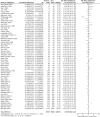Preventive zinc supplementation for children, and the effect of additional iron: a systematic review and meta-analysis
- PMID: 24948745
- PMCID: PMC4067863
- DOI: 10.1136/bmjopen-2013-004647
Preventive zinc supplementation for children, and the effect of additional iron: a systematic review and meta-analysis
Abstract
Objective: Zinc deficiency is widespread, and preventive supplementation may have benefits in young children. Effects for children over 5 years of age, and effects when coadministered with other micronutrients are uncertain. These are obstacles to scale-up. This review seeks to determine if preventive supplementation reduces mortality and morbidity for children aged 6 months to 12 years.
Design: Systematic review conducted with the Cochrane Developmental, Psychosocial and Learning Problems Group. Two reviewers independently assessed studies. Meta-analyses were performed for mortality, illness and side effects.
Data sources: We searched multiple databases, including CENTRAL and MEDLINE in January 2013. Authors were contacted for missing information.
Eligibility criteria for selecting studies: Randomised trials of preventive zinc supplementation. Hospitalised children and children with chronic diseases were excluded.
Results: 80 randomised trials with 205 401 participants were included. There was a small but non-significant effect on all-cause mortality (risk ratio (RR) 0.95 (95% CI 0.86 to 1.05)). Supplementation may reduce incidence of all-cause diarrhoea (RR 0.87 (0.85 to 0.89)), but there was evidence of reporting bias. There was no evidence of an effect of incidence or prevalence of respiratory infections or malaria. There was moderate quality evidence of a very small effect on linear growth (standardised mean difference 0.09 (0.06 to 0.13)) and an increase in vomiting (RR 1.29 (1.14 to 1.46)). There was no evidence of an effect on iron status. Comparing zinc with and without iron cosupplementation and direct comparisons of zinc plus iron versus zinc administered alone favoured cointervention for some outcomes and zinc alone for other outcomes. Effects may be larger for children over 1 year of age, but most differences were not significant.
Conclusions: Benefits of preventive zinc supplementation may outweigh any potentially adverse effects in areas where risk of zinc deficiency is high. Further research should determine optimal intervention characteristics and delivery strategies.
Keywords: Preventive Medicine; Public Health.
Published by the BMJ Publishing Group Limited. For permission to use (where not already granted under a licence) please go to http://group.bmj.com/group/rights-licensing/permissions.
Figures
References
-
- Hotz C, Brown K; International Zinc Nutrition Consultative Group (IZiNCG). Assessment of the risk of zinc deficiency in populations and options for its control. Food Nutr Bull 2004;25(1 Suppl 2):S94–203 - PubMed
-
- Maggini S, Wenzlaff S, Hornig D. Essential role of vitamin C and zinc in child immunity and health. J Int Med Res 2010;38:386–414 - PubMed
-
- Black RE, Victora CG, Walker SP, et al. Maternal and child undernutrition and overweight in low-income and middle-income countries. Lancet 2013;382:427–51 - PubMed
-
- Aggarwal R, Sentz J, Miller MA. Role of zinc administration in prevention of childhood diarrhea and respiratory illnesses: a meta-analysis. Pediatrics 2007;119:1120–30 - PubMed
-
- Brown KH, Peerson JM, Baker SK, et al. Preventive zinc supplementation among infants, preschoolers, and older prepubertal children. Food Nutr Bull 2009;30:S12–40 - PubMed
Publication types
MeSH terms
Substances
LinkOut - more resources
Full Text Sources
Other Literature Sources
Medical






